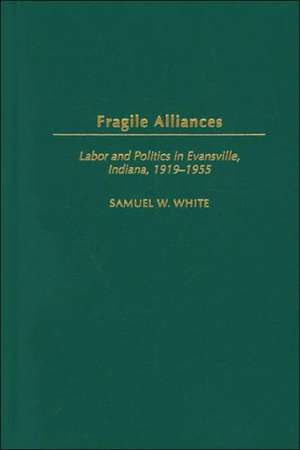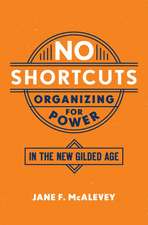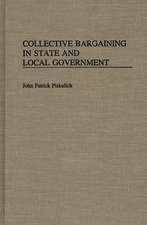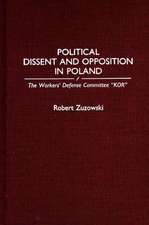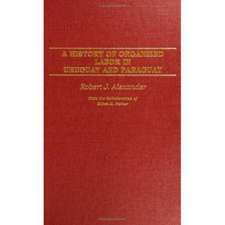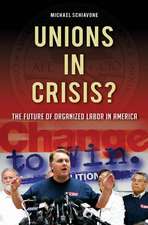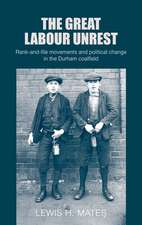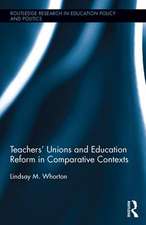Fragile Alliances: Labor and Politics in Evansville, Indiana, 1919-1955: Contributions in Labor Studies
Autor Samuel W. Whiteen Limba Engleză Hardback – 29 iul 2005 – vârsta până la 17 ani
Din seria Contributions in Labor Studies
- 27%
 Preț: 464.05 lei
Preț: 464.05 lei - 38%
 Preț: 344.31 lei
Preț: 344.31 lei - 24%
 Preț: 458.91 lei
Preț: 458.91 lei - 28%
 Preț: 462.79 lei
Preț: 462.79 lei - 28%
 Preț: 462.20 lei
Preț: 462.20 lei - 28%
 Preț: 437.91 lei
Preț: 437.91 lei - 18%
 Preț: 322.11 lei
Preț: 322.11 lei - 27%
 Preț: 439.51 lei
Preț: 439.51 lei - 28%
 Preț: 461.52 lei
Preț: 461.52 lei - 28%
 Preț: 437.15 lei
Preț: 437.15 lei - 28%
 Preț: 434.78 lei
Preț: 434.78 lei - 38%
 Preț: 440.36 lei
Preț: 440.36 lei - 38%
 Preț: 437.67 lei
Preț: 437.67 lei - 38%
 Preț: 439.77 lei
Preț: 439.77 lei - 38%
 Preț: 437.31 lei
Preț: 437.31 lei - 24%
 Preț: 464.05 lei
Preț: 464.05 lei - 24%
 Preț: 461.77 lei
Preț: 461.77 lei - 38%
 Preț: 440.11 lei
Preț: 440.11 lei - 27%
 Preț: 345.42 lei
Preț: 345.42 lei - 27%
 Preț: 438.33 lei
Preț: 438.33 lei - 28%
 Preț: 438.07 lei
Preț: 438.07 lei - 27%
 Preț: 438.51 lei
Preț: 438.51 lei - 38%
 Preț: 437.84 lei
Preț: 437.84 lei - 38%
 Preț: 346.74 lei
Preț: 346.74 lei - 38%
 Preț: 345.83 lei
Preț: 345.83 lei - 24%
 Preț: 464.13 lei
Preț: 464.13 lei - 38%
 Preț: 437.47 lei
Preț: 437.47 lei - 38%
 Preț: 438.59 lei
Preț: 438.59 lei - 28%
 Preț: 437.67 lei
Preț: 437.67 lei
Preț: 436.92 lei
Preț vechi: 603.71 lei
-28% Nou
Puncte Express: 655
Preț estimativ în valută:
83.60€ • 87.52$ • 69.18£
83.60€ • 87.52$ • 69.18£
Carte tipărită la comandă
Livrare economică 07-21 aprilie
Preluare comenzi: 021 569.72.76
Specificații
ISBN-13: 9780313321573
ISBN-10: 0313321574
Pagini: 222
Dimensiuni: 156 x 235 x 24 mm
Greutate: 0.47 kg
Editura: Bloomsbury Publishing
Colecția Praeger
Seria Contributions in Labor Studies
Locul publicării:New York, United States
ISBN-10: 0313321574
Pagini: 222
Dimensiuni: 156 x 235 x 24 mm
Greutate: 0.47 kg
Editura: Bloomsbury Publishing
Colecția Praeger
Seria Contributions in Labor Studies
Locul publicării:New York, United States
Notă biografică
Samuel W. White is Assistant Professor of Labor Education at the University of Missouri-Columbia. His teaching and research interests include twentieth-century labor history, work organization, and grievance administration. He resides in Columbia with his wife, Sukanya, and children, Jacob and Brishti.
Cuprins
AcknowledgmentsAbbreviationsIntroductionEvansvilleAmericanism and the Retreat of Labor in the 1920sDepression Politics and Industrial OrganizationWar Politics and the Labor MovementLabor, Politics, and Anticommunism in Postwar EvansvilleConclusionBibliographyIndex
